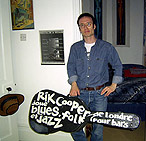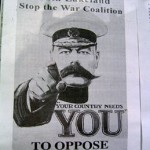An interesting story in the Grauniad about a new bookshop opened near the British Museum by Alan Bennett and the board of the London Review of Books. Called the London Review Bookshop, it claims to cater for the discerning book-buyer, who is apparently neglected by the vulgar “pile ’em high” shops like Books etc, Borders and Waterstones. Bennett says, “Just as the supermarket takes the pleasure out of shopping, so it does out of buying books.” I really like Alan Bennett, and I’m sure the bookshop is a good one – I mean, any bookshop has got to be a good one at the end of the day – but I have to disagree with this comment about supermarkets. Most supermarkets, I agree, are nasty places, especially the cheap and nasty ones, but I have to confess to a longstanding love affair with my local branch of Waitrose. The lighting is subtle, the products are well-chosen, the prices aren’t the cheapest but the quality is really high, the staff are excellent, and I know where everything is. In any case, the pleasure or otherwise of shopping always depends for me on who I’m shopping with. In other words, unless I’m on my own, it’s a pain in the arse.
So, farewell then, guitar-case lettering (13/07/93 – 01/05/03)…
 Years ago – ten, to be exact – I went to Paris for the first time. I was 22, single, ripe for adventure, and planned to travel for a long time in France, a country for which I’ve always had a deep love. My idea was to live off my savings and, if at all possible, busking. I’d never busked before, but I’d played guitar since I was 14 and had been in a couple of bands, and had this brilliantly romantic notion that I could avoid the world of work by strumming So Long, Marianne and Layla in the Paris metro.
Years ago – ten, to be exact – I went to Paris for the first time. I was 22, single, ripe for adventure, and planned to travel for a long time in France, a country for which I’ve always had a deep love. My idea was to live off my savings and, if at all possible, busking. I’d never busked before, but I’d played guitar since I was 14 and had been in a couple of bands, and had this brilliantly romantic notion that I could avoid the world of work by strumming So Long, Marianne and Layla in the Paris metro.
However, when I arrived in the city, all I wanted to do was walk around and explore, and lugging a guitar case everywhere proved to be something of an impediment, so for the first week or so the instrument stayed stashed under my hotel bed. When I finally took it out I found I was much more nervous about losing my busking virginity than I’d anticipated; I wandered around Paris for several hours not busking, not even opening the case, and returned to my hotel room feeling something of a failure.
I then hit on an idea to do something which might help me feel more confident: I should paint on the case my name and my style of music, so that even if I didn’t have the guts to open it and play the instrument, people would at least know I was a guitarist and available for bars, weddings, bar mitzvahs and all the rest of it. It was a kind of advert, but I think it also had deeper psychological roots in terms of my self-image and identity; then again it could also have stemmed from the same kind of rationale that inspires you to build a website before you’re actually famous enough to justify having one.
Anyway, I went into an art shop, explained in broken French what I wanted to do, was sold some white oil paint and a brush, and retired to my hotel room where I whiled away a few very relaxing hours painting the lettering you see in the picture. I thought I’d then go out for a spot of lunch while the paint dried, come back, take the case outside, wander around and maybe even do some busking. However, when I got back to my room – which was on the top floor of an old hotel in the Latin Quarter, accessed by about 100 stairs – the paint was still wet. Three more hours later it was no better. By now I was quite keen to take it out and advertise myself, so I hit on the idea of borrowing a hair-dryer from a neighbouring Australian girl and drying the paint with that. I must have sat there for an hour training that hair-dryer on my case, and not only did it make absolutely no difference to the paint but the appliance overheated and cut out, and I couldn’t get it going again. The next thing I knew I could hear an Australian accent on the landing; the girl was knocking on another door nearby and asking if anybody in there had borrowed her hair-dryer. “No,” came another Australian accent, “but we’ve heard it, though.” I sat tight, buttocks clenched with embarrassment as she knocked on my door. I didn’t make a sound; eventually she went away, and to my relief the hair-dryer cooled down sufficiently to work again. By now it was dinnertime. I gave the girl back her hair-dryer – although what she thought I might have been doing with it for so long I don’t know, as my hair was only about an inch longer than it is now – and went out for something to eat.
Later, before I went to bed, I thought maybe a night spent in the open air would dry the paint, so I got some string, tied one end around the handle of the guitar case and the other around the leg of the desk in my room, and suspended the case out of my window to give it a proper airing. I barely slept that night worrying that the string would snap, sending the case clattering seven floors to the ground, waking up the entire hotel and getting me booted out in the middle of the night. But, as with so many things in life, it didn’t happen, and I was almost disappointed to wake up and find the case still dangling out the window. I hauled it in like a kite, touched the paint… and found it was still as wet as it had been the day before.
I was at my wits’ end; by now all I wanted to do was busk. (I suppose if nothing else, being forced to wait had at least made me more keen.) I couldn’t risk wandering about the city with the paint still wet; I pictured myself on a packed metro, the case pressed up against some innocent Parisian whose suit would end up printed with a backwards version of my name and repertoire. I reasoned that maybe what I needed was some kind of fixative; I was about to go back to the art shop when I remembered I had some spray-on Brut aftershave in my suitcase, and wondered if that might do the job. To my relief, it worked, and although the case now stank to high heaven I was then able to brave the world of buskology complete with a free advert of my services. I was still nervous, but once I’d started to play a bit it became easier. One hour and about 16 centimes later, I was an old hand. The next day I made ten francs in half an hour, and went off to buy my lunch with it, flush with the feeling that I’d hit the big time.
However, that represented the height of my earnings, and within a couple of weeks I’d sent the instrument and the case back home so I could continue my journey around France unimpeded. When I eventually came back to the UK, I faced the problem of having to walk around with this “decorated” guitar case, and realised it wasn’t really me at all: it seemed OK in Paris when you were 22 but back home when you were a bit older it was just naff. Plus, people would inevitably ask why the lettering was in French or why I’d painted the case at all, and after you’ve told a story like this once or twice it becomes a bit tiresome (“Hear hear!” – the web-surfing public). It was ironic that the very thing that had helped me get through the nervousness of busking was now an impediment in itself. But I also thought that getting rid of the lettering would be bad luck somehow: painting the case was something I’d done to feel better about myself, to boost my confidence, to make myself seem more – real, somehow. So for the next ten years I’d hardly ever take the guitar outside again, too superstitious to paint over my naff lettering, too embarrassed to flaunt the case and too much of a tightwad to reach a compromise and just buy a new one.
Anyway, when the other day a musician friend suggested I come over at the weekend for a jam, the whole story came back to me with all its related dilemmas and worries and superstitions. In the end though, I decided enough was enough; I’m 32 now, I’m an artist, I’m a married man and I will not walk around with my name on my guitar case. I went to my local art shop, explained the situation in broken English, was recommended to try enamel or gouache, bought both, came back and spent a very relaxing half hour painting out all those old indecisions, insecurities and psychological cul-de-sacs once and for all. And I felt much better about it; finally I’d closed a door that had been jammed open, or opened one that had been jammed shut, or whatever, for a whole decade. And to boot, I also found out not only that gouache dries a hell of a lot quicker than oil paint, but, according to the little tin of enamel paint (which I didn’t use), the French for “enamel” is email…
What a waste
The Independent reports that up to 13 Iraqis died when US soldiers fired on a group of people in Fallujah protesting about the the Americans’ occupation of a school, which they wanted reopened. The soldiers said some people had guns and they felt threatened. Well, to stop feeling threatened they could perhaps try leaving the country. Obviously some policing needs to be done by someone, but preferably by people who know what they’re doing. If the US is at all serious in its claim that the war is “over” and the people of Iraq have been “liberated”, it must put a stop to these Wild West-style shoot-outs. Amnesty International says: “the USA and the UK [must] deploy forces in sufficient numbers and with the right training and equipment to restore law and order, until Iraqi police forces can operate effectively.” Apart from the killing of those 13 people, the saddest part of this story is that the formerly mild-mannered headmaster of the school in question now says he is willing to become a martyr to avenge the Americans.
Elsewhere in the Independent, it is reported that David Blunkett says Labour could benefit from a supposed “Baghdad bounce” boost in support among its working-class voters at the local elections this week. The home secretary says criticism of the war is “a class issue”, implying that only the middle classes opposed it. When I went on the march through London on 15th February with two million other people, I didn’t notice much of a class divide, David, although I guess you probably weren’t there to see for yourself (no sick pun intended, but I don’t know how else to put it). Anyway, as ever it’s reassuring to see a Labour politician – the home secretary at that – exploiting the class divide to win cheap political points.
* * *
Meanwhile, spamming (sending junk email that is, not slapping people on the forehead) has officially become a criminal offence in the US state of Virginia, according to this report from Internet Magazine. A BBC 10 O’Clock News item on this subject also found that up to half of the millions of emails people now receive worldwide every day are unsolicited adverts for various rubbish, and even more incredibly, something like 90% of all spam ultimately derives from just 180 people around the world. All of which reminds me, I must update Spamcat…
Liberating stuff
Internet Magazine reports that a group of archaeologists and art historians have established a website in an attempt to publicise Iraqi treasures looted in recent weeks so that they become too high-profile to sell.
This comes on the same day as paintings by Van Gogh, Gauguin and Picasso were “liberated” from a Manchester art gallery.
The paintings in question have been immediately valued at £1m… not so the Iraqi treasures.
* * *
Even when you’re working from home and doing what you want to do you still have to put up with Mondays. A typical Monday today, grey and depressing, and not much done. At one point I was so bored I even Googled for myself. As usual I didn’t appear within about the first 342 pages of search results but I was intrigued to read the comments of one Richard Cooper who did, in this story about a wax museum in Las Vegas which has added a Saddam Hussein figure to its range of exhibits. This has, naturally, proved so controversial that visitors are flocking from all over to see it, denounce it and pose for photos with their hands around its throat. The Richard Cooper in question (a Vietnam vet and retired firefighter from Virginia) says about Saddam, “I believe in the Old Testament: an eye for an eye and a tooth for a tooth.” Hmm… one to add to Thoughtcat’s “Richard Coopers I’m Not” page (under construction). Also quoted is a relative of one of the people killed in the World Trade Centre attacks, who tragically proves what propaganda can do by saying she believes 9/11 was the work of Saddam. She comments that she’s “totally offended” by the statue, adding: “Killing him wouldn’t be enough.” Eh?
The poetry and the bollocks
Ex-Python Terry Jones continues his excellent column in the Observer with a piece headlined Mr Blair’s dark days, in which he echoes my own sentiments from 18th April about Tony’s “worst fear” about the war, i.e. that it’d cause him to lose his bloody job.
On a lighter note, elsewhere in the paper there’s a lovely profile of performance poet John Hegley, who says that poetry “is the opposite of speaking words which are mundane. It’s words that are charged, it’s vibrancy, mystery, aliveness, intensity – and bollocks.”
The riting wracers
Our Man in Wimbledon tells me of a great story he heard apparently about a novel-writing speed record attempt in Germany this week. Surely this, with its shades of the great Python sketch featuring Michael Palin giving a running commentary as F. Scott Fitzgerald (it was him, wasn’t it?) makes inroads into his new novel, was too good to be true? Sadly, it seems that way – after some time spent Googling for the story, according to the BBC it turns out it was part of Germany’s World Book Day activities, and wasn’t technically a competition but an effort by a group of 40-odd (maybe that should be 40 odd?) German authors to write and publish a book in one day, with the authors writing two pages each. I have to say I was disappointed, although according to another report, the print run of 1,000 copies sold out in five minutes, which is pretty impressive.
I wonder though who the fastest novelist actually is? I know that Anthony Burgess once wrote six novels in six months or something, and of course Barbara Cartland used to knock out her bodice-rippers on an almost weekly basis. But although Burgess was generally fast, he was under a death sentence when he wrote all those books – diagnosed (wrongly) with a brain tumour, he’d been told he had only a year to live, and wanted to provide for his potential widow – and Cartland used to dictate her novels from a sofa, which doesn’t really count as writing in my book. Plus they’re both dead. However, I do know from his excellent book On Writing that Stephen King writes 2,000 words a day every day for three months to produce the first draft of one of his blockbusters, so maybe he’d be in with a shot?
Adrian vs Harry
Sue Townsend, the author most famous for her Adrian Mole books, is questioned by Independent readers. She was kind of a heroine of mine when I was 12 and the first of the Mole books came out. I was talking about this the other day with someone and we were comparing Mole, something of a crucial eighties figure, with the fictional boy of the moment, Harry Potter. Mole was a total anti-hero, and rarely succeeded in anything – indeed, most of his triumphs were internal and psychological – but you loved him anyway. I liked the first of JK Rowling’s books and I’m eternally grateful to her publisher Bloomsbury for subsidising my favourite living author Russell Hoban, but I feel I could relate to Mole much better. Potter is meant to be real, but you know he isn’t, while Moles exist everywhere you go: you know Potter is going to win through, destroy the evildoers and (eventually, one presumes) get the girl, but there was never any such certainty with Adrian. Among some of the lovely things Townsend says in the interview is that her blindness – a late-onset condition brought about by diabetes – if nothing else “does get you out of the ironing, and reading other people’s manuscripts”. She also makes a fascinating comparison of the sexual (self-) identity of Tony Blair and Saddam Hussein: the latter “drips” with testosterone, while the “androgynous” Blair is much less self-assured about himself in this department. Obviously, dripping with testosterone is hardly any better, but Blair androgynous! Brilliant.
The axis of anti
The Observer reports that a wave of books critical of the US stance on the war have become bestsellers in that country, with Greg Palast‘s The Best Democracy Money Can Buy, Michael Moore’s Stupid White Men and Noam Chomsky’s 9/11 forming the “axis of anti”.
The same issue of the paper also prints a version of an excellent speech by actor and director Tim Robbins in which he says “Basic inalienable rights, due process, the sanctity of the home [in the US] have been compromised in a climate of fear.” He goes on to relate a great story of how his 11-year-old nephew stood up to his schoolteacher who was ranting about Robbins’ wife Susan Sarandon‘s anti-war stance.
The Independent today features a savage article from John Pilger about the aftermath of the war, warning against the “unthinkable” of what was done and both that and our reactions to it becoming “normalised”. (The Independent however has since started to charge for archived articles at the rate of £1 a time; I have my doubts about how long that’s going to last.)
While we’re on the subject of the war, I must put in a belated plug for playwright David Hare’s beautifully written piece from the Guardian on 12th April, “Don’t look for a reason”, sub-headlined “All the explanations for this war are bogus – Bush only invaded Iraq to prove that he could.” Hare also points out what I mentioned a while back about the lack of a leader in the anti-war movement. I have to wonder if Tim Robbins, who played a nastily ambitious US politician in his brilliant political satire Bob Roberts a few years ago, would consider running for office…?
* * *
Meanwhile, poet Christopher Logue writes a nice piece about his friendship with the late Leonard Cohen-inspirer, Sir Paul Getty. He writes that when they first met, Getty was surrounded by books, many of which were poetry, among them “a selected edition of Robert Herrick, the loveliest book I had ever seen, and an example of wonderful English bookbinding. From, I think, the Doves Press, it had a soft green leather cover studded with a hundred primroses tooled in gold. ‘You see,’ he [Getty] said, ‘when you open it,’ opening it, laying it on the side table, ‘it stays open. And when you close it,’ closing it, ‘there is an almost silent gasp.'” Which will probably end up in next week’s Pseud’s Corner, but you have to admit that books just don’t do that anymore, do they?
The most deluded man in the world
Several papers report today on an interview Tony Blair granted the UK’s war-friendliest rag, The Sun, in which Tone confides with characteristic disingenuousness that he considered resigning over his stance on Iraq and that he was “upset” when the UN didn’t pass the second resolution. It’s hard to imagine a more minty piece of humbug than this: if millions marching through central London (and just about everywhere else in the world) to protest against the war, and the vote of some 150 of his own MPs in opposition to the government’s action didn’t convince him to either quit his post or oppose military intervention himself, what, exactly, would have done?
The Guardian (which headlines its report, “Blair feared for premiership over war” – what, in the past tense?) also quotes Blair: “The most terrible thing for someone in my position is to end up losing your job for something you don’t really believe in.” Final proof, then, that the killing, “orphaning”, maiming and general destruction has always come second to our illustrious leader’s preservation of his own career.
* * *
So, farewell, then, Sir Paul Getty. When I read the news, I couldn’t help but think of the great line from Leonard Cohen’s song Jazz Police: “Jazz Police are paid by J. Paul Getty / Jazzers paid by J. Paul Getty II…”
A peaceful break
Catching up on my emails after a short break in the Lake District, I find Thoughtcat’s West Drayton representative has sent a link to a story from ZNet’s fine round-up of Iraq commentaries about US marine Stephen Eagle Funk. He faces a court martial and probable prison sentence after refusing to fight on the basis that the war is “immoral because of the deception involved by our leaders”. Fantastic name, and, like e.e. cummings’ “conscientious object-or” Olaf, Funk is “more brave than me:more blond than you”.
I must admit I took advantage of the peace and quiet in the Lakes to avoid the news as best I could for a few days. Even so, I couldn’t avoid the war completely, either in the form of some terrifyingly loud training flypasts of fighter jets, or in more peaceful ways, as we found when we came upon this Quaker meeting hall while strolling through the pretty village of Ambleside…


